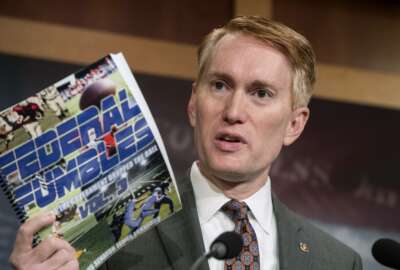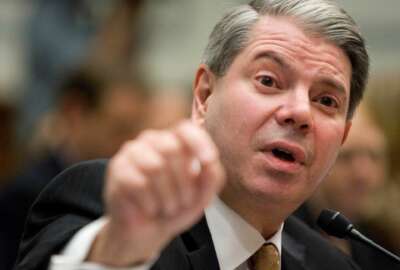

Automatic General Schedule step increases, the lengthy federal hiring process and the retirement supplement for certain employees are among the issues Sen. Jame...
The federal waste book has earned a special place in the hearts of many lawmakers in recent years, who have taken valuable staff time and attention to compile a list of the inane, highly ridiculous examples of government spending gone awry.
The latest edition of Sen. James Lankford’s (R-Okla.) waste book, “Federal Fumbles: Ways the Federal Government Dropped the Ball,” is no different. A $50,000 National Endowment for the Humanities grant to a professor for his study on the Russian wine industry, for example, got a special mention in Lankford’s fourth edition, which he released Tuesday.
But this year’s report has a different — and perhaps more practical — focus. Lankford chose to highlight more process and systemic, policy-oriented challenges that, in many cases, have been deeply embedded in government for decades.
“In the past we focused just on the numbers and on specific ideas on how to be able to reduce spending,” Lankford told reporters Tuesday morning. “This year we focus a lot on process … that has to change behind the scenes or just areas of inefficiency in government that hurt our economy or hurt the way we actually receive revenue.”
Many of the proposals the Office of Management and Budget made last June to reorganize government, shift agency activities and merge others, have Lankford’s support. He introduced legislation last year which passed out of the Senate Homeland Security and Governmental Affairs Committee but stalled in the Senate. The bill essentially would have given the Office of Management and Budget the authority to prepare a reorganization plan and gives Congress a path to consider and pass those proposals as individual legislation.
“That’s going to be a trust issue,” Lankford said of the administration’s proposed reorganization plan. “Quite frankly, that’s probably going to be more likely a second-term [issue] than it is a first-term for this president. We’re in a presidential-election mode, and my Democratic colleagues are going to try to oppose anything that he brings forward. I understand that politically, but realistically, there are some changes that need to be made, at least some conversations that we need to have on some of these issues.”
Building off his background as chairman of the Senate Homeland Security and Governmental Affairs Subcommittee on Regulatory Affairs and Federal Management, Lankford flagged a variety of familiar challenges in the federal workforce.
The federal hiring process is another new “fumble,” according to Lankford. The Office of Personnel Management last testified before Lankford’s subcommittee a year ago that it took, on average, 106 days for agencies to hire new talent.
“You’re never going to get the most competitive work environment if it takes that long,” Lankford said.
He advocated for an expanded direct-hire authority to help agencies more quickly recruit top talent.
Lankford also flagged the special retirement supplement for federal employees who retire before they’re eligible to receive Social Security benefits at age 62. The supplement should be phased out, he said, citing data and a proposal from the Office of Personnel Management, which he said eliminating the additional annuity would save $18.7 billion over 10 years.
“That’s going to be controversial,” Lankford acknowledged. “One of the things that I’ve proposed into it right from the beginning: We shouldn’t touch any existing federal employees. They came under a hiring regime under that benefits package. Leave it exactly as it is, but at some point, we have to address that as a federal government.”
The supplemental annuity is most popular for federal employees in law enforcement positions, who are statutorily required to retire, in some cases, before age 62.
The automatic pay and step increases that federal employees receive up and down the General Schedule is another pain point. As a solution, Lankford suggested step-increases for federal employees should be merit-based, rather than based on a federal employee’s time in service.
Lankford also devoted a significant amount of time in this year’s waste book to his concerns with the budget process.
“If we don’t fix the budget process, we’re never going to fix the budget product,” he said. “Our process does not lend toward solving the final product.”
Government shutdowns, as members of Congress have repeatedly pointed out in recent months, waste billions of taxpayers’ dollars, Lankford said. He’s part of a group of lawmakers that have, following the most recent 35-day government shutdown, suggested legislative fixes that would prevent future lapses in appropriations.
Lankford reiterated that proposal, called the Prevent Government Shutdowns Act, in his waste book. The bill, which has Sen. Maggie Hassan (D-N.H.) as a co-sponsor, recommends an automatic continuing resolution if Congress can’t pass new appropriations bills by the end of the fiscal year. It would restrict members of Congress and employees at the Office of Management and Budget from leaving the Washington, D.C., area until all budget business is finished.
“The leverage point is travel,” Lankford said. “If members have to be here nights and weekends, if they can’t go on [congressional delegation trips] and [staff delegation trips], if their staff can’t travel and we actually have to stay in Washington, D.C., until the work is done, that’s a very effective motivator.”
In addition, Lankford suggested changes to the Senate rules and aired frustrations with the IT systems at the Department of Veterans Affairs. He also pointed to the Grant Reporting Efficiency and Agreements Transparency (GREAT) Act as a viable solution to streamline the federal grant making process.
Copyright © 2024 Federal News Network. All rights reserved. This website is not intended for users located within the European Economic Area.
Nicole Ogrysko is a reporter for Federal News Network focusing on the federal workforce and federal pay and benefits.
Follow @nogryskoWFED



